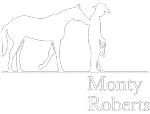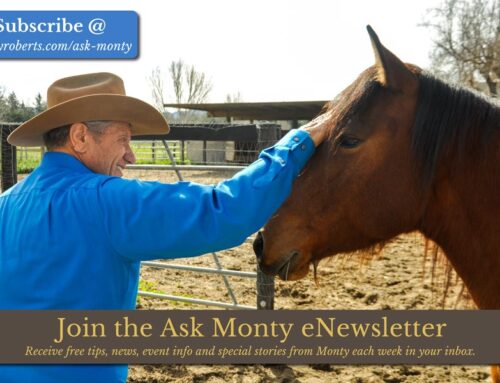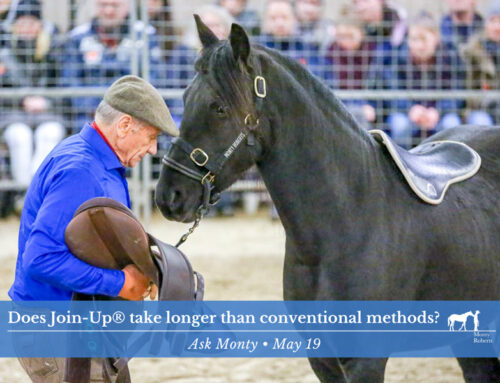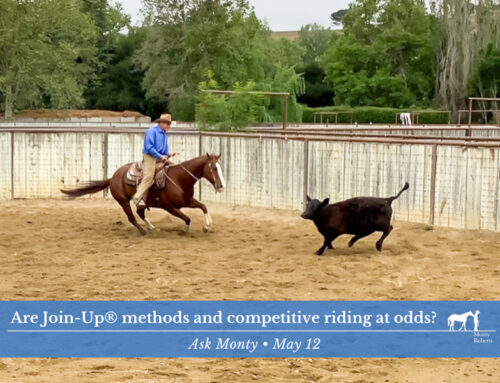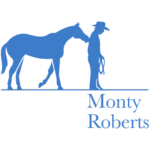February. 12, 2020 – Ask Monty Newsletter
Question: Do you train using treats?
In Ireland at the moment there is, as you probably know from Caitriona, Patrick, Claire and Caroline, a growing interest in horsemanship that rejects violent training methods. Catriona has been of immense help to me from a distance, and I did a course with Caroline Jennings a few years back (and with Kelly, many moons ago).
But, there is a growing group that seem to say that any method that is not their method, which they term “positive reinforcement” is wrong. Their method is clicker training, to the best of my knowledge.
I must admit, the results look great, and I support any good non-violent training method. Indeed, I have a small, once abused, pony, that could probably do well with this training. I’m sending you a link to this website, and while I think there are a lot of good practice in what Philippa Christie says, I really object to the inference that any other method is wrong. The method involves treats – non-stop treats.
As a Montessori trained teacher, this kind of motivation goes against the grain as the ideal would be that the student would respond from an intrinsic desire to do the right thing, and not for a treat. I feel that followers of the clicker method would work towards non-treat motivation, I don’t know enough about it at the moment to say if this is the case or not. The Irish exponents of this first came to my attention when they posted the study that “cast doubt” on natural horsemanship and Monty’s methods in particular, and negative comments regarding natural horsemanship escalated.
Best Wishes,
Dee
Monty’s Answer:
Dear Dee,
Thank you very much for your recent communication, I have communicated with the public many times on this subject. It seems however that one can always improve one’s explanation for any given training method. Let me try to do that for you in the next few paragraphs.
First let me say that horses are flight animals. They never stalk, kill or devour any other species which means that it is difficult to make a case for food being a reward. No blade of grass has ever run from a horse. They don’t need to stalk it and they will have difficulty considering it a reward. Treats are, in my opinion, the best method in the world to train a horse to do one certain behavior, it is the best method of training a horse to bite their handler. Have a look at the clicker trained horses fed treats and you will witness an enormous group of equine individuals who consistently bite their handlers.
It is also true that most horses who bite are also head shy. This makes sense because the human who is bitten will generally slap the nose of the biting horse. It is my opinion that marker training can be very effective. I would explain that the marker, not the treat, indicates the behavior witnessed is desirable. For the flight animal, it’s my position that food is a bad reward. I have my own set of markers and reinforcers but I would rather not begin to describe them because I believe that they are actions that might vary greatly from trainer to trainer. These markers and reinforcers are actions of mine which clearly communicate acceptance of the action.
It is my position that these markers are extremely important but what they are is far less important. Markers should never be violent, I mark bad behavior with non-violent actions which must be completed within 3 seconds of the behavior expressed. In behavioral science this method is PICNIC. PICNIC is an acronym for positive instant consequences and negative instant consequences and the definitive word is instant. The NIC can never be violent and the PIC can not be food, in my world. My students have created many of their own PICNIC actions and I enjoy studying their various mindsets.
My studies in behavioral sciences clearly define for me, that food for the flight animal, particularly the grazer, is not a positive action. Any action that results in weakening a behavior falls squarely into the area of consequences. A positive (+) consequence is when we add an action that results in lessening a behavior. A Negative (-) consequence is when we take something away that results in lessening a behavior.
Sincerely, I could write a full book of my 80 years of discovery regarding the training of horses which follow the scientific patterns that I was taught in four different Universities. Please don’t feel that I believe I have all the answers. Each one of us is still working at getting our training right for the horse.
Sincerely,
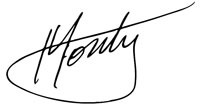
Read the full newsletter: Do you train using treats?
